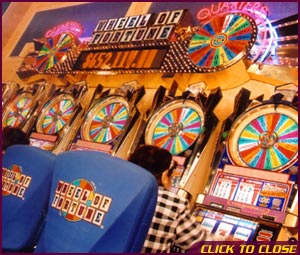 Another Stereotype of the Month entry:
Another Stereotype of the Month entry:
 Another Stereotype of the Month entry:
Another Stereotype of the Month entry:
Trade & Commerce
On the look out for suspicious activity and dirty money
Indian Gaming Column: Let the games continue
Posted: March 24, 2003 -- 5:28pm EST
by: Jim Adams / Managing Editor / Indian Country Today
Speaking of money laundering and mobsters, there's been another sighting of organized crime at Indian casinos. It's shown up not only on "The Sopranos" on HBO but now on USA Network's "The Dead Zone." The March 16 episode of the psychic thriller, loosely based on the Stephen King novel, revolves around supposed mafia financing of a fictitious Initiative 151 in Maine to authorize tribal casinos. (Since the episode was written and filmed, a very real casino initiative has qualified for the Maine ballot this November, but it doesn't have that designation.)
In the alternative Maine of "The Dead Zone," psychic Johnnie Smith, played by Anthony Michael Hall, has to figure out a gangland killing. His trail takes him to the fictitious Hollow Horn Resort Casino owned by the Mahopiac tribe in the un-fictitious Berkshire town of Stockbridge, Mass. (once home to the Stockbridge-Munsee Mohicans.) To gain access to the casino manager Jonas, an Indian stereotype with roach and ponytail played by Steven Cree Molison, Smith uses his psychic powers to throw hard eights at the craps table and gets himself banned. Gangsters, meanwhile, swarm the place, just as Tony Soprano and his crew get VIP treatment at the Mohonk casino in eastern Connecticut.
This is fiction, of course. The Mohonk and Mahopiac tribes, from the viewpoint of the TV writers, are conveniently extinct, and Stockbridge is probably the last place in Massachusetts that would accept a casino, if and when the state allows one. Likewise, the sighting of a known mobster at a real casino, Indian or otherwise, would trigger major repercussions. The writers at the "Sopranos" and "The Dead Zone" don't seem to realize that casinos keep watch lists of undesirables who can't even go in their parking lots. (We recall that the Mohegan Sun once threw out an actor in another HBO series.)
The tribal casinos are going one further on the watch list in a program recently announced by the National Indian Gaming Association. In 2002, NIGA formed the Native American Intelligence Surveillance Information Network (Intelligence Network) to share information on potential criminal penetration of the casinos.
Said NIGA President Ernest Stevens Jr., "While there is often friendly competition among Indian casinos for customers, there's one area where cooperation makes more sense -- keeping out cheaters and thieves. NIGA and the Intelligence Network are dedicated to developing, organizing and implementing a system that will share information about cheats, scams and frauds to prevent criminal activity. This is an innovative endeavor, surpassing the efforts of even Las Vegas and New Jersey."
Stevens emphasized that tribes have a huge stake in keeping their gaming industry clean, things like services for members, economic success and sovereignty. Regulation, and self-regulation, is the means for preserving these gains.
Critics of tribal casinos conveniently overlook these layers of controls. They very rarely mention industry initiatives like the Intelligence Network or tribal cooperation with federal law enforcement agencies like FINCEN. But these are very real and growing elements in the Indian gaming world.
Rob's comment
Having gangsters swarm an Indian casino is a variation of portraying Indians as greedy and corrupt.
Related links
The facts about Indian gaming
|
. . . |

|
All material © copyright its original owners, except where noted.
Original text and pictures © copyright 2007 by Robert Schmidt.
Copyrighted material is posted under the Fair Use provision of the Copyright Act,
which allows copying for nonprofit educational uses including criticism and commentary.
Comments sent to the publisher become the property of Blue Corn Comics
and may be used in other postings without permission.